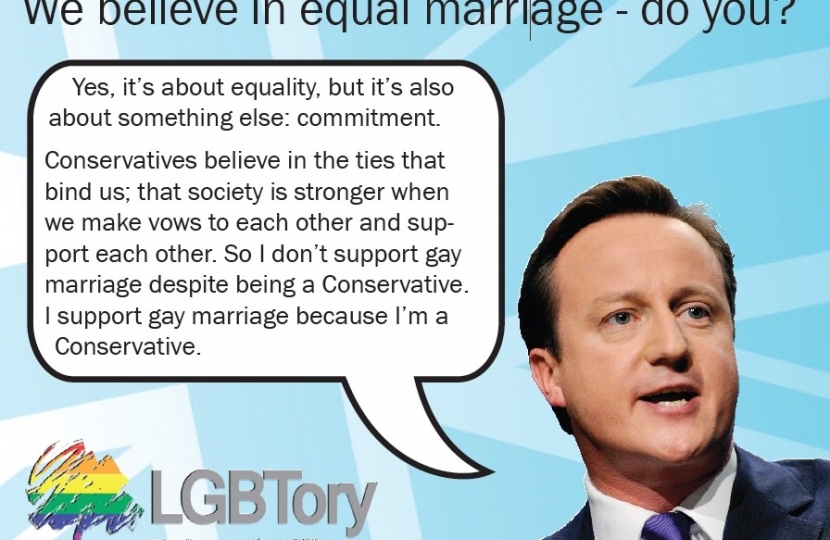
Gay marriage is an emotive issue for many. Just this morning the Bishop of Leicester, the Rt Reverend Tim Stevens took to The Today Programme to make the bold claim that the church could "come under threat" if marriage legislation the government proposes is enacted. This kind of hysterical claim must be very welcome by those supporting the move towards equal marriage and indeed was described by Ben Summerskill, chief executive of gay and lesbian rights organization Stonewall, as a "masterclass in melodramatic scaremongering".
More worryingly we saw a recent Bow Group debate on the subject descend into threats and intimidation and an MP, Stephen Gilbert, who spoke in favour of equal marriage escorted out of the meeting by police for his own safety.
The arguments against equal marriage continue to be well rehearsed by those who oppose it. It’s hard to take most of them seriously when these are the same arguments that were wheeled-out to oppose the decriminalization of homosexual, to oppose an equal age of consent and to oppose civil partnerships.
We are told that equal marriage would lead to bestiality, polygamy and incestuous relationships. It’s a wonderfully phantasmagorical concept whereby the mere permitting of two women to exchange wedding vows will lead to the breakdown of our moral society as we know it. Bestiality and polygamy are, and will remain illegal and as polygamy in the true Late Greek sense is a man taking multiple wives, there is no reason to connect it to homosexual relationships. These arguments are at best childish and at worst the product of smear from a determined opponent. The one thing they lack though is a shred of credibility.
The most common disaccords to the subject are religious-based. In particular opponents quote various passages from The Bible, particularly Leviticus, where marriage is defined and homosexuality condemned. It is easy to write these off as a questionable translation, or to question even the relevance of The Bible in a country where church attendance continues to decline, but that’s a rather reductionist argument. Many people, in or out of church, continue to take guidance and comfort from religion. Many gay and lesbian people are enthusiastic attendees at churches high and low, and to write-off religion as irrelevant would leave them in an awkward position. It’s about definition and over its long history the church has redefined many things, including the definition of its own priests who became celibate in the Roman Catholic Church and of both genders in the Church of England. During Apartheid South Africa religion was used to justify a ban on marriage between races, as their contemporary definition of it didn’t permit such thing. The essential definition of marriage is the binding of a loving couple. It’s hard to define same-sex couples as different enough to fall outside of that.
And then there’s sex. Any argument on marriage equality inevitably seems to focus on sex sooner or later. Pro-creation is the foundation and purpose of marriage we are told, but in contemporary society this no longer adds up. There are plenty of childless (by choice or otherwise) couples, step-parents and adoptive parents who prove that marriage and children come in many combinations. With many same-sex parents being parents there is already an equality of state that would satisfy all by the most purist of genetic obsessives. Children benefit from loving families and good role models, but we’ve rather missed the boat if we are to insist that should be one mummy and one daddy.
The arguments against equal marriage aren’t new, but we aren’t living in the 1950s any longer. We’ve long recognised homosexuality as valid and in contemporary society we all have friends, neighbours, colleagues, priests, milkmen who are gay and lesbian. Equal marriage isn’t about destroying marriage, or making it less important. Marriage should continue to be the “gold standard” for relationships.
I am deliberate in my use of “equal” rather than “gay” marriage as that’s what the government proposes: for all loving couples, heterosexual or homosexual, to have an equal opportunity to make the commitment of marriage to each other. Civil Partnerships were an important step but having a separate, special kind of marriage perpetuates the offensive notion that same-sex relationships are less valid. Homophobic bullying is still a huge problem in our schools, and we continue to see a large number of attacks against lesbians and gay men. It is therefore as vital as ever that we recognise everyone in society as valid citizens, and that the objects of state endorse this view.
The Prime Minister said at this year’s Conservative Party Conference that “society is stronger when we make vows to each other and support each other”. Making these vows and commitments to each other is a strong Conservative ethic. The government proposes to allow same-sex loving couples to also show their commitment and become married. They key thing about this legislation is the message it portrays; both in the UK and the wider-world. The government is right to say that same-sex relationships are equally valid, and it must stick by its convictions to recognise and demonstrate this.
Colm Howard-Lloyd, LGBTory National Policy Officer
